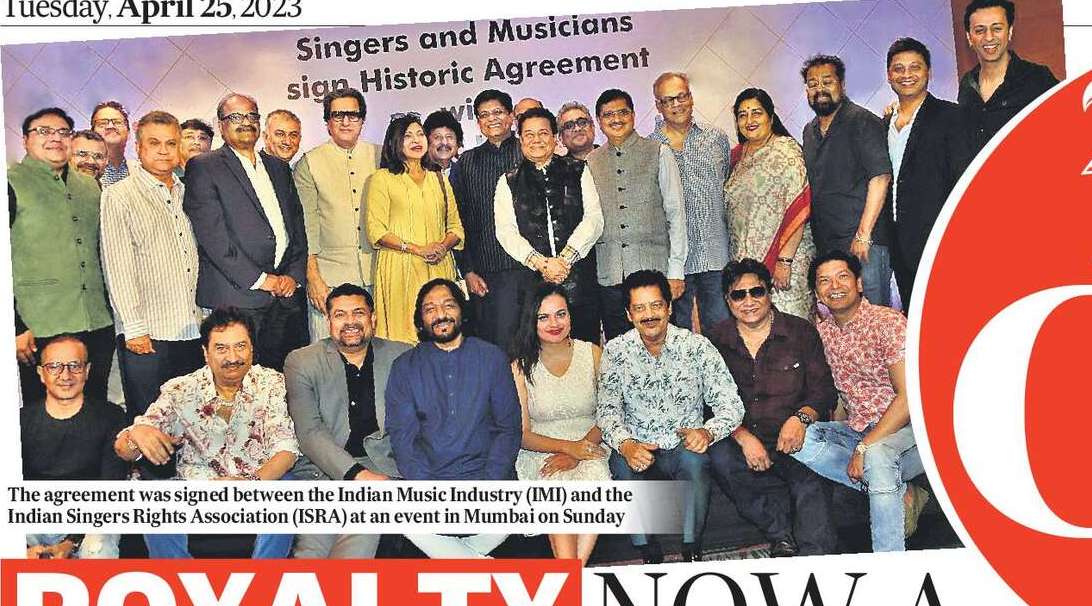Royalty now a reality: Singers rejoice at landmark feat
8:43 AM
Posted by Fenil Seta

A crucial agreement signed recently has paved the way for artistes to be paid their dues
Rishabh Suri (HINDUSTAN TIMES; April 25, 2023)
In a glittering event held in Mumbai on Sunday, the Hindi music industry turned up in full force to witness a big feat for artistes. The Indian Music Industry (IMI) and the Indian Singers Rights Association (ISRA) signed an agreement, whereby all registered singers will now be paid royalty by music labels for the songs they have sung.
As per this, 25% of the collections of Phonographic Performance Ltd (PPL) — the governing body responsible for collecting and distributing royalty — will be paid to singers who are part of the ISRA. This also includes posthumous royalty paid to an artiste’s surviving family.
Union minister Piyush Goyal, who played a key role in facilitating the agreement, said on the occasion, “When this amendment was made in 2012, I was an MP of the opposition. But, in June 2019, when I took charge of the Ministry of Commerce and Industry, I came to know that nothing had been done in seven years. I felt that this was an injustice to those singers who had served the nation with their talent.”
Welcoming the agreement, singer Udit Narayan tells us, “Jiss din ka humein intezaar tha, woh ab nazdeek lag raha hai. We have struggled for this for so many years now. Chaliye, marne se pehle kam se kam royalty mil raha hai. I am very happy, thanks to ISRA and the ministry.”
For singer Alka Yagnik, this agreement has been no less than a dream. “This is a significant decision. We never really thought it would happen. This debate started in the early 1990s, so this dream has been there with me for 30 years. Pehle singers mein unity nahin thi, iss endeavour ke liye unity badhaai gayi,” she says.
How much royalty will be paid will be decided basis the number of songs of a singer played across radio stations, concerts, shows, etc. Sanjay Tandon, CEO of ISRA, informs that in India, radio stations, OTT and TV stations refuse to pay singers their dues: “Even after the 2012 amendment, where it was clear that radio stations playing a singer’s song will have to pay royalty, they (radio stations) ganged up and decided to not pay. They are people with big pockets, they expect us to take them to court, and we cannot fight them. It is a huge expense... People playing music at concerts and occasions — why do they want to play a singer’s song, but not pay them? This is why we took the initiative.”
Singer Shaan adds that the disagreement between singers and music labels has been a huge obstacle. “What they thought was fair, was not fair for us, and vice versa. A lot of credit goes to Anup Jalota ji (president, ISRA). He put that hand out and welcomed music companies towards us.”
This entry was posted on October 4, 2009 at 12:14 pm, and is filed under
Alka Yagnik,
Anup Jalota,
Bollywood News,
Indian Singers Rights Association,
Piyush Goyal,
Sanjay Tandon,
Shaan,
Udit Narayan
. Follow any responses to this post through RSS. You can leave a response, or trackback from your own site.
Subscribe to:
Post Comments (Atom)
Post a Comment